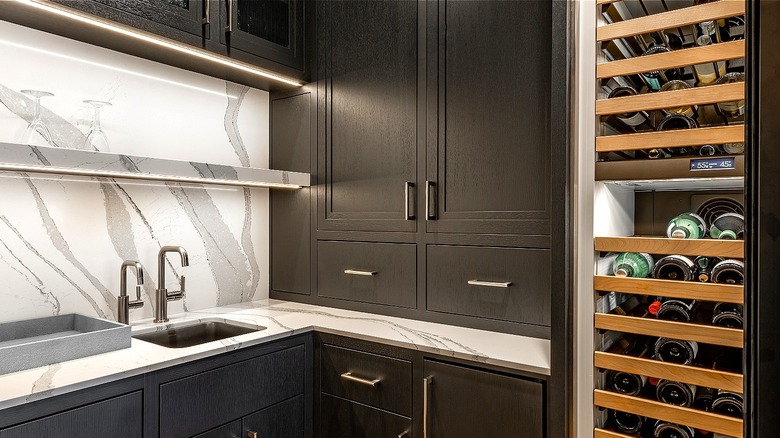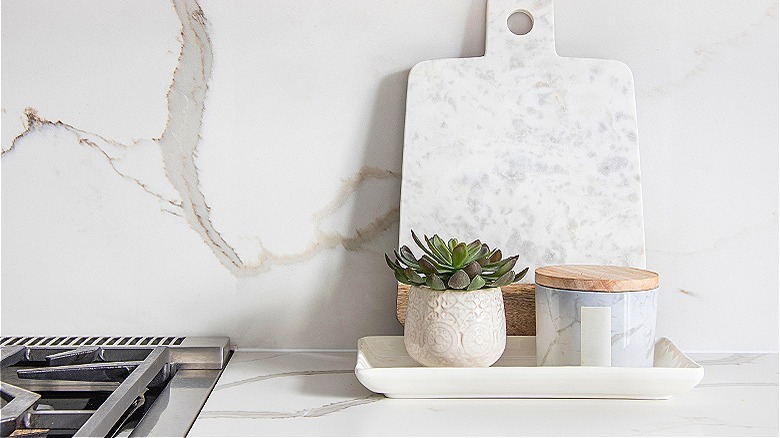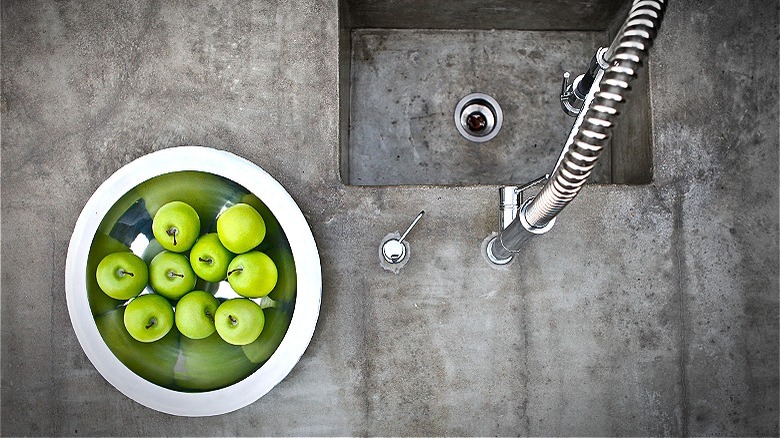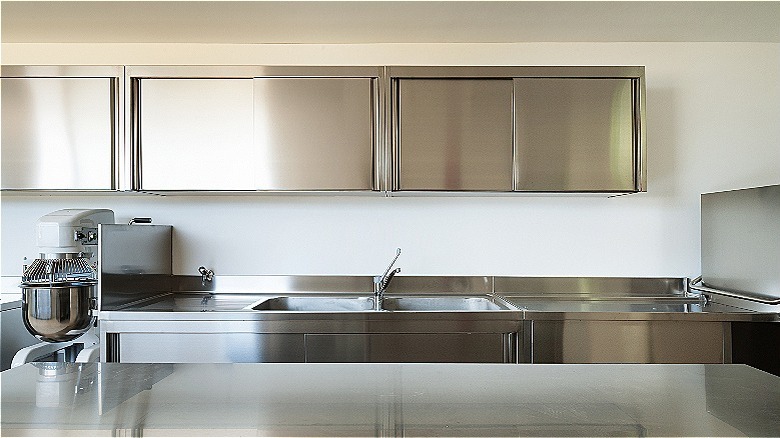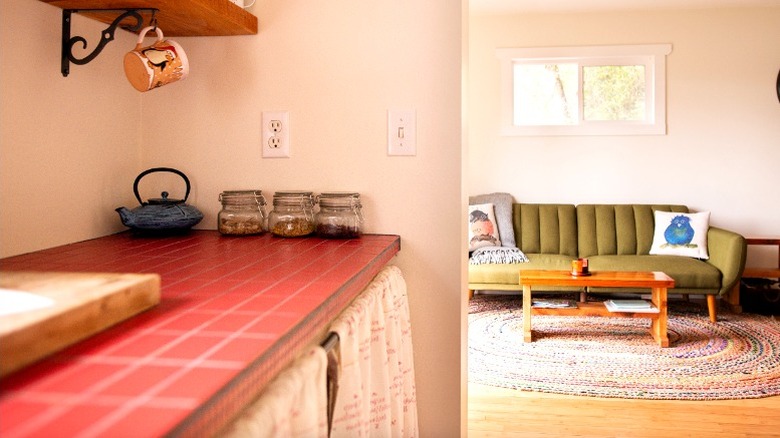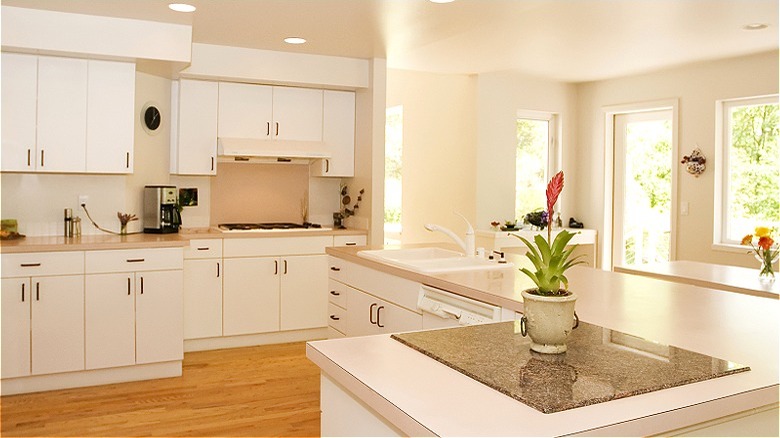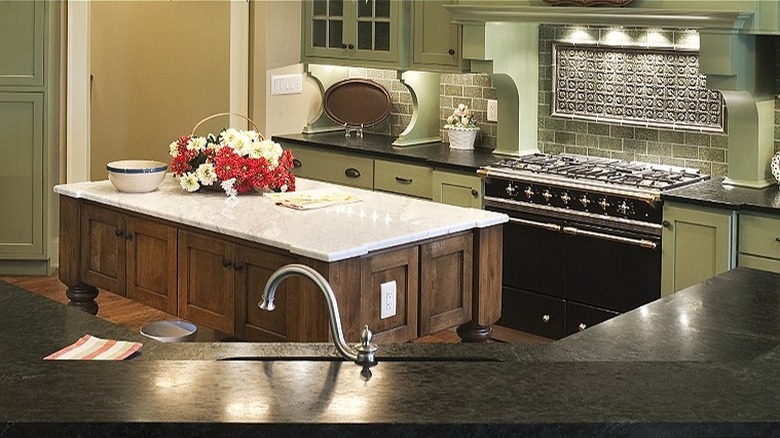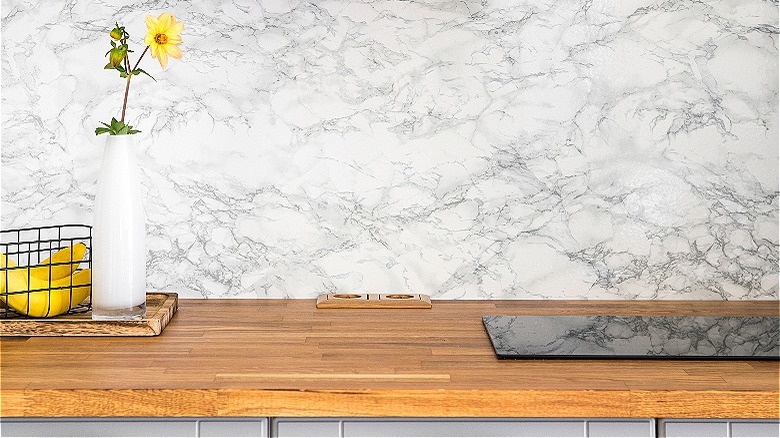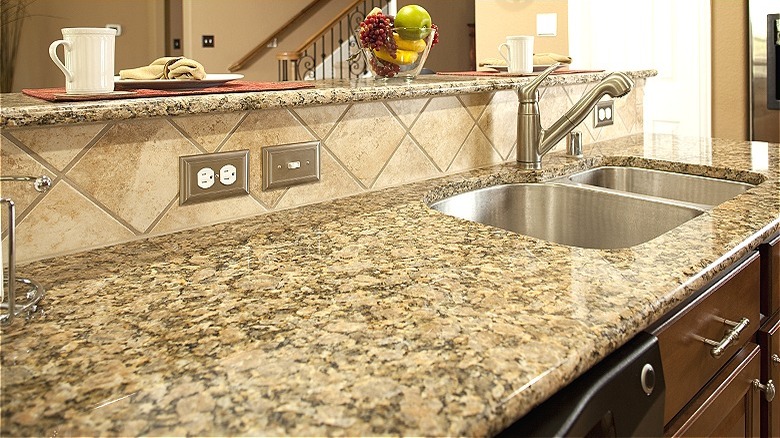The 8 Countertops That Are Best Suited For A Wet Bar
Recently, stylish home bars have been taking over as a way to bring the night-out experience into your own space. If you've been looking for a way to take it a step further than a bar cart or corner of the counter, however, look no further than a wet bar. These spaces combine the fun of an at-home bar with the convenience and functionality of a sink, meaning you'll be able to whip up cocktails without having to run to the kitchen to clean glasses or rinse out your shaker. If you're considering incorporating this element into your space, however, there are a few important considerations you need to take into account when choosing the material for your countertop.
Most countertop materials are fairly durable, but there are a few that do better in the specific conditions of a wet bar. These areas often have to face off against drips, spills, and staining, and choosing a countertop material that's built to withstand this kind of wear and tear will ensure your setup is both long-lasting and easy to maintain, even through the occasionally rowdy night in with friends.
Quartz
Marble countertops are beautiful, but they can also be incredibly expensive and require a large amount of maintenance. If you want a similar look that's both more durable and slightly gentler on your wallet, consider quartz. Quartz countertops are still one of the pricier options for counters, but they're resistant to liquids, don't require sealing, and are easy to clean with just a simple wipe-down with an all-purpose cleaner and a rag — perfect for a space where you'll likely face frequent drips and spills. This material is also man-made, meaning there's more flexibility in choosing your final look than if you were to go for real marble.
Concrete
Concrete might not be the first material that comes to mind when you think of countertops, but it's a great choice if you're a fan of a more modern, industrial aesthetic. Concrete is exceptionally durable, so there's no worry of cracking with regular wear and tear, and it's highly customizable, allowing you to create the exact look you're going for. Despite this durability, however, concrete does require regular sealing, waxing, and cleaning to prevent stains from liquids, but it's a great option if you're willing to put in a bit of extra work a couple times a year and quickly tidy your messes.
Stainless steel
Stainless steel countertops are a popular choice in professional kitchens for a reason. They're resistant to staining, scratches, and water damage, and they're easy to clean if you do end up making a mess. They're also fairly inexpensive, especially when compared to natural stone options. The downside, however, is lack of flexibility. For the most part, your only option for customization is whether you want a brushed or smooth finish. Nevertheless, stainless steel is a solid choice if it fits with the other aesthetic decisions you made in your home and for the rest of the wet bar, especially if you're on the hunt for something sleek and modern.
Tile
Tiled countertops have fallen from grace a bit since the peak of their popularity, but it turns out they might be coming back into style. This vintage-inspired look presents a great option if you're looking for something more cost-effective, and tiled countertops provide you with plenty of opportunity to play around with different colors and textures thanks to the large number of options available on the market. The problem, however, is that grout is often fairly difficult to keep clean, especially if you're frequently spilling liquids, but choosing a darker color or mixing drinks on a secondary surface, like a cutting board, can help reduce this issue.
Laminate
Laminate countertops have gotten a bit of a bad rap over the years, but, if you're looking for a low-cost option, they're basically impossible to beat in terms of price. This low price, however, does come with a few downsides. Laminate scratches easily and is prone to heat damage, making it a slightly inconvenient choice for typical kitchens. In a wet bar, though, you're likely going to be using the counters much less, and there's very little worry about damage from heat. As long as you use a cutting board for garnishes and keep water away from seams to avoid warping, laminate is a solid wet bar countertop choice.
Soapstone
If you're still willing to splash out a bit more on natural stone countertops but you want to ensure you still have plenty of durability and damage resistance, consider soapstone. This material is similar to marble or granite, but it's low-porosity, meaning it won't absorb spilled liquids as easily. It's also very hard, meaning the likelihood of scratches or other surface damage is lower. Unfortunately, it's not very customizable as it's only available in its trademark deep gray or black colorway, but it's a durable and luxurious choice if you're a fan of a dramatic, dark look in your wet bar.
Butcher block
Fans of the modern farmhouse or shabby chic décor are likely no strangers to butcher block countertops, but this rustic option can do a lot more than simply bring a touch of quaintness to an otherwise sleek space. High-quality butcher block counters were designed to withstand nicks and gashes from knives, so, if you want a surface that allows you to slice lemons, prepare garnishes, and chop herbs for inclusion in your favorite cocktails, this is a great choice. Using your countertop this way, however, likely will leave you with some wear and tear down the line, but with proper maintenance and cleaning, you shouldn't face serious issues.
Granite
Granite countertops might have a few downsides, but they're a classic choice and a major selling point for a reason. Granite is a natural stone that can bring a classy, sophisticated finish to your wet bar, but that beauty requires a bit more upkeep than something like stainless steel. If you're dead set on this look, however, it isn't the end of the world. As long as you properly and routinely seal your granite countertops, you shouldn't have to worry about liquids staining or damaging the surface, and they're resistant to heat damage and scratches if you decide to get a bit more experimental with your cocktails.
